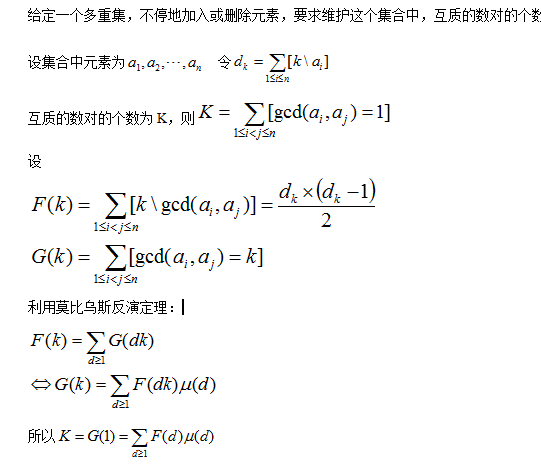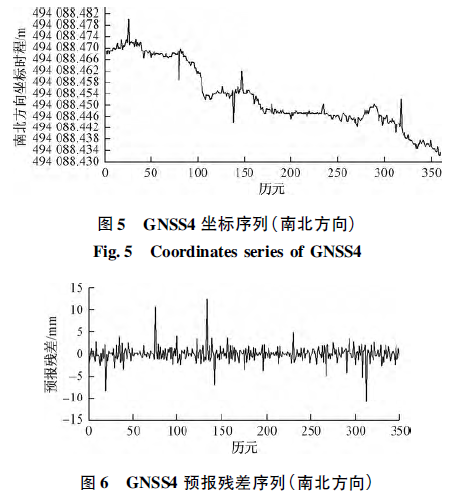本文主要是介绍hdu6053 TrickGCD 莫比乌斯反演,希望对大家解决编程问题提供一定的参考价值,需要的开发者们随着小编来一起学习吧!
TrickGCD
Time Limit: 5000/2500 MS (Java/Others) Memory Limit: 262144/262144 K (Java/Others)Problem Description
You are given an array A , and Zhu wants to know there are how many different array B satisfy the following conditions?
* 1≤Bi≤Ai
* For each pair( l , r ) ( 1≤l≤r≤n ) , gcd(bl,bl+1...br)≥2
* 1≤Bi≤Ai
* For each pair( l , r ) ( 1≤l≤r≤n ) , gcd(bl,bl+1...br)≥2
Input
The first line is an integer T( 1≤T≤10 ) describe the number of test cases.
Each test case begins with an integer number n describe the size of array A .
Then a line contains n numbers describe each element of A
You can assume that 1≤n,Ai≤105
Each test case begins with an integer number n describe the size of array A .
Then a line contains n numbers describe each element of A
You can assume that 1≤n,Ai≤105
Output
For the k th test case , first output "Case #k: " , then output an integer as answer in a single line . because the answer may be large , so you are only need to output answer mod 109+7
Sample Input
1 4 4 4 4 4
Sample Output
Case #1: 17
Source
2017 Multi-University Training Contest - Team 2
import java.io.BufferedReader;
import java.io.InputStream;
import java.io.InputStreamReader;
import java.io.PrintWriter;
import java.math.BigInteger;
import java.util.Arrays;
import java.util.StringTokenizer;public class Main {public static void main(String[] args) {new Task().solve();}
}class Task {InputReader in = new InputReader(System.in) ;PrintWriter out = new PrintWriter(System.out) ;final long Mod = 1000000007L ;final int N = 100000 ;int[] mu = new int[N+1] ;int[] prime = new int[N+1] ;boolean[] vis = new boolean[N+1] ;{int cnt = 0 ;Arrays.fill(vis, false);mu[1] = 1 ;for(int i = 2 ; i <= N ; i++){if(! vis[i]){prime[cnt++] = i ;mu[i] = -1 ;}for(int j = 0 ; j < cnt && i * prime[j] <= N ; j++){vis[i * prime[j]] = true ;if(i % prime[j] == 0){mu[i * prime[j]] = 0 ;break ; }mu[i * prime[j]] = -mu[i] ;}}}long pow(long x , int y){long s = 1 ;for(; y > 0 ; y >>= 1){if((y & 1) > 0){s *= x ;s %= Mod ;}x *= x ;x %= Mod ;}return s ;}void solve(){int t = in.nextInt() ; for(int cas = 1 ; cas <= t ; cas++){int[] sum = new int[2*N+1] ;int _min = Integer.MAX_VALUE ;int _max = Integer.MIN_VALUE ;long all = 1 ;Arrays.fill(sum, 0) ;int n = in.nextInt() ;int[] a = new int[n+1] ;for(int i = 1 ; i <= n ; i++){a[i] = in.nextInt() ;_min = Math.min(_min , a[i]) ;_max = Math.max(_max, a[i]) ;sum[a[i]]++ ;all *= a[i] ;all %= Mod ;}for(int i = 1 ; i <= 2*N ; i++){sum[i] += sum[i-1] ;}long _all = 0 ;for(int d = 1 ; d <= _min ; d++){long h = (mu[d] + Mod) % Mod ;for(int g = 1 ; g <= _max/d ; g++){int cnt = sum[d*(g+1)-1] - sum[d*g-1] ;h *= pow(g, cnt) ;h %= Mod ;}_all += h ;_all %= Mod ;}all -= _all ;all %= Mod ;all = (all + Mod) % Mod ;out.println("Case #"+ cas + ": " + all) ;}out.flush() ;}}class InputReader { public BufferedReader reader; public StringTokenizer tokenizer; public InputReader(InputStream stream) { reader = new BufferedReader(new InputStreamReader(stream), 32768); tokenizer = new StringTokenizer(""); } private void eat(String s) { tokenizer = new StringTokenizer(s); } public String nextLine() { try { return reader.readLine(); } catch (Exception e) { return null; } } public boolean hasNext() { while (!tokenizer.hasMoreTokens()) { String s = nextLine(); if (s == null) return false; eat(s); } return true; } public String next() { hasNext(); return tokenizer.nextToken(); } public int nextInt() { return Integer.parseInt(next()); } public int[] nextInts(int n) { int[] nums = new int[n]; for (int i = 0; i < n; i++) { nums[i] = nextInt(); } return nums; } public long nextLong() { return Long.parseLong(next()); } public double nextDouble() { return Double.parseDouble(next()); } public BigInteger nextBigInteger() { return new BigInteger(next()); } }
这篇关于hdu6053 TrickGCD 莫比乌斯反演的文章就介绍到这儿,希望我们推荐的文章对编程师们有所帮助!






